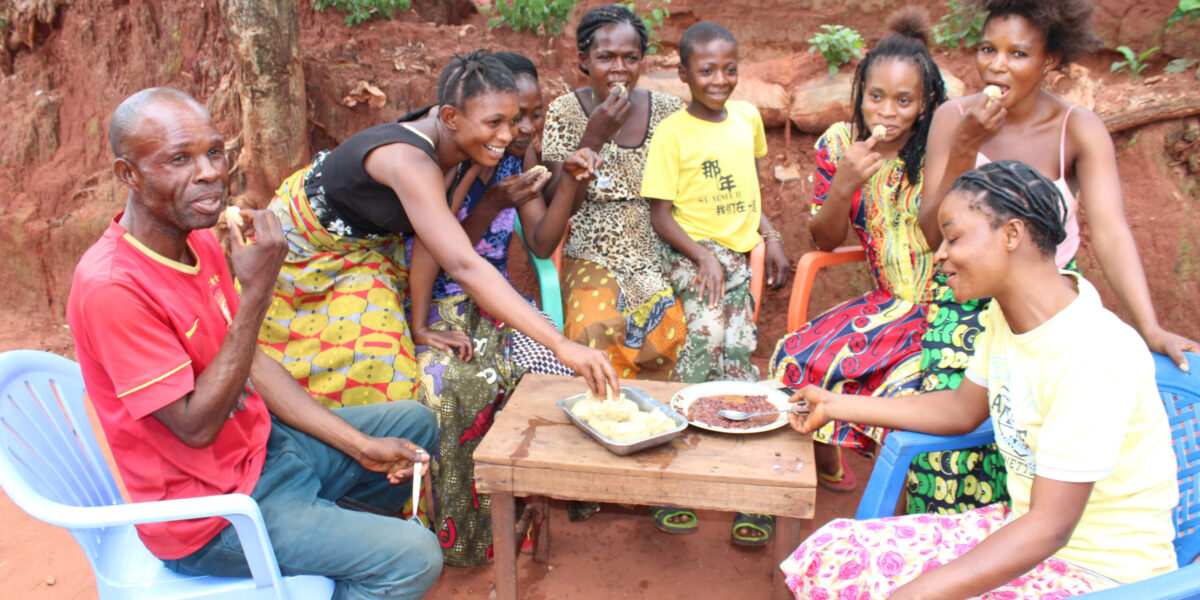Mennonite churches continue to help displaced people to rebuild their lives three years after violence in the Kasai region of the Democratic Republic of the Congo caused 1.4 million people to flee their homes. This article was adapted for Mennonite Mission Network. To read the complete article, click here.
Laughter has returned to Tshikapa, a city in the Democratic Republic of Congo. Women laugh as they help each other with small-business endeavors, and children’s happy voices announce their return from school. The laughter contrasts with the horrors experienced two and three years ago, when these internally displaced people and thousands of others fled their villages in the Kasai region. They brought nothing with them except memories of beheadings, burned houses, and lost family members.
The educational opportunities and income-generating projects are a result of Christian love shown by Mennonite, Evangelical Mennonite, and Mennonite Brethren churches in the cities of Tshikapa and Kikwit and in the Kabwela area. Church members shared what they had with displaced people who flooded their communities and settled in their church and school yards.
Later, beginning in 2017, local churches made major food distributions with resources provided by Anabaptist organizations from Europe and North America. Mennonite Mission Network joined seven other agencies in a partnership organized by Mennonite Central Committee (MCC).
More than 1.4 million people were displaced and about 5,000 killed in political fighting between the Kasai militia group Kamuina Nsapu and government forces.
Congolese churches continued distributing emergency food in 2018-2019 to 1,180 displaced families. They also helped pay school fees and provided school supplies for 950 children.
"[The international Anabaptist] response helped to strengthen the church. It brought people to Jesus," said George Kaputu, an evangelist at the Communauté Evangélique Mennonite (Evangelical Mennonite Church) in the Kabwela area. "Because of this response, we are able to observe the compassion of those in the church to respond to the needy."
Livelihoods and trauma care
The violence has abated in Kasai now. Yet many displaced people are still rebuilding their families, homes, emotional health, and income in a new place. Returning to their home villages is not an option for many because their villages were destroyed or are still unsafe.
The churches continue to help displaced people this year by providing pigs, gardening supplies, and garden plots. Over time, piglets and farm produce can be sold, helping families become self-sufficient.
Churches also are providing trauma healing workshops, led by lay leaders who help workshop participants recognize trauma’s impact and to offer each other support for moving on with their lives.
"Wounds of trauma are deep and wide," said Mulanda Juma, MCC representative for Congo. "Some people show inability to address their own basic needs without support; some still remain hopeless. These wounds will take long to heal. Therefore, trauma healing response will remain a critical component of recovery both for individuals and communities."
Strengthening churches
Samuel Kimenga was one displaced person who became reconnected to the church because of the kindness of Communauté des Eglises de Frères Mennonites au Congo (Mennonite Brethren Church of Congo) in Kikwit.
Kimenga’s children were happy because they could go to school with the church’s educational support. He and his wife attended the trauma healing workshops.
"We had left the church," Kimenga said. "It had been a while since we had entered a church to worship, but through this kindness, we returned to attend church again."
Now he is a member of the Kikwit relief committee that coordinates distributions and other support for the most vulnerable displaced people.
Through interaction among the three denominations, new relationships were formed, said Ruth Keidel Clemens, director of programs for MCC U.S.
Continuing with hope
The work of the relief committees continues even though food distributions have ended. International funds assist the churches’ educational, trauma and livelihood projects. Though health care is an unmet need, according to Juma.
Life is still uncertain for displaced people as they wait for the farming and pig-raising projects to provide a stable income, but hope has returned. For example, when Kanku Ngalumulume first came to Tshikapa, the 10-year-old had no one. He said he had run away from his home village of Senge when his parents and his siblings were beheaded. "I have no hope for any reason," he told Juma in February 2018.
A year and half later, Ngalumulume is sitting in the midst of the Tshiama family—two parents and five girls—as they eat together. His eyes sparkle with life and hope.
Organizations supporting the distributions include Africa Inter-Mennonite Mission; Caisse de Secours, the development arm of the French Mennonite Church; International Community of Mennonite Brethren; MB Mission; Mennonite Church Canada Witness; Mennonite Mission Network; Mennonite World Conference; and Swiss Mennonite Conference.







